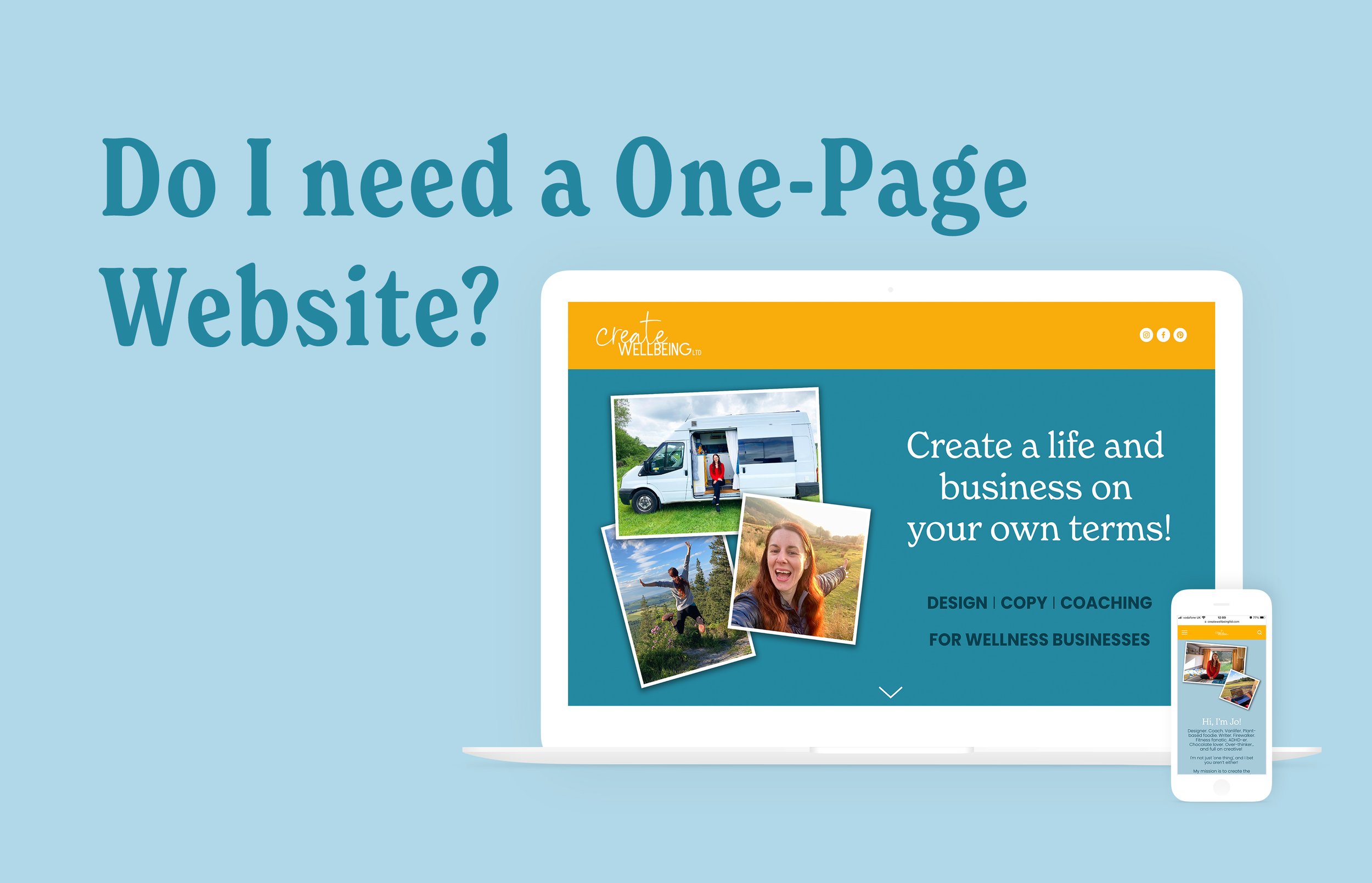Do I need a One-Page Website?
For many of my design clients, launching a new business or in the early stages of testing out a new product or idea, a full website is simply too much for their current needs or daunting to create when they have limited content starting out.
A One Page Website condenses and highlights all the critical information to connect potential clients with your brand, service or product without the ‘excess’ that a full website can sometimes feel like.
A single page website design allows you to control how users experience your web page as a sequential story as they scroll down and gather more information.
All your information is positioned in a specific order, making it easier for your audience to navigate and find what they need to know when they interact with your brand. It’s easy to scroll through and doesn’t take much time to find what they’re looking for.
Single page sites are great at quickly communicating the value of a product, brand, or service and will lead to a clear ‘call to action’ to help clients take the next steps in their journey with you.
Another great thing about a single-page website is that it's very compatible with mobile viewing, which so many of us do these days. We are already used to long-form scrolling and there is no need for jumping around finding things in a menu bar on a small screen.
Let’s Future proof…
But what if later I want more than the one page?
I hear you.
A One Page Website might be a good fit now, but what about later down the line, when your business has grown and evolved, or you have more content that you want to share?
I’ve got you covered, by future proofing for expansion.
The way I approach One Page Websites also makes it very easy for streamlined future expansion, and in fact I specifically build that into my website design strategy.
So you can easily expand your existing site to a multi-page layout in the future (either DIY or with the help of a designer) and I guide you through that process too.
I allow for this easy expansion by considering each section of the single page as a mini version of the standard main pages. For example:
A standard website is often based on a ‘five page’ layout:
Home
About
Services/Product
Blog/News
Contact
The single scrolling home page would contain the main landing welcome banner followed by a succinct section for each of the page themes above.
As there will be no dedicated blog page, this could either be omitted or linked to articles you’ve published elsewhere or to social media posts. Similarly, for a shop of gallery.
In the future, if your needs change and you decide that you would like to expand the single page site to become a full five (or more) page site, you can simple create the additional pages with more in depth content expanding upon the summary sections on the homepage. You’d then have a link from each section to the relevant page as well as being listed in the top menu bar.
It’s a very organic and natural expansion process.
Here is what I consider One Page Websites best suited to:
New businesses with minimal content or looking for a simple streamlined approach.
The fast launch of an initial website with a view to add additional content later down the line.
Those testing out a new project idea or in the early stages of a new venture.
A singular product or event launch.
A secondary website for a side hustle or additional arm of a main business.
A hub or homepage that brings together and links multiple aspects and external platforms.
It’s cost effective!
As an additional benefit, it goes with out saying that from a financial point of view, a one-page site is typically much cheaper to commission a designer to build. The timeframe for completion is often significantly faster too!
I offer One Page Website design as part of my Design Day approach.
So what are the downsides?
A One Page website won’t be suited to everyone or every purpose. Whilst I believe it can suit many business needs, particularly given the easy expandable nature of the design, here are some things to consider to understand whether a single page or a multi-page is the best fit for you.
A One Page Website is not best suited to blog-centered websites that plan to have a lot of content by way of written articles, galleries, videos etc.
It won’t be suited if you know you need to have multiple products or services or an extensive shop built into the platform itself and not linked externally.
It may not be a good fit if you are a business that has multiple strands to what you offer, as there is only so much information that you can put onto one page before it becomes overwhelming for your site visitors. In this case a multi-page site is a better option.
On the other hand, you may decided to create a single page ‘hub’ with external links to all the things you offer - for example Facebook group/page, secondary websites, online shops or profiles on a specific platforms.
Another point to note is that single-page websites can be challenging to optimize for SEO (search engine optimisation) because there’s far less content compared to a full-size website and so Google wont be able to pick up on keywords so well.
I consider a single page website more of an online portfolio and you would focus on driving traffic to it by your own efforts rather than relying on google searches, which personally I would suggest is the main focus regardless.
Are you considering a new website?
Has this helped you better understand the options and what your needs would be best suited to?
If you’d like to explore the concept of a One Page Website with built in future expansion further with me, I’d be more than happy to chat. You can find more info on the process here.
Get in touch via email or drop me a text of voice note via Voxer @johodson
I’m here to remind you, you don’t have to focus on ‘one thing’ to create a wildly successful life. It’s time to embrace ALL of who you are!
If you are ready to empower a quietly unconventional life and business, here’s how I could help you right now to kickstart your next chapter…
Grab a Get Unstuck Session
Take a look at Coach on Call

